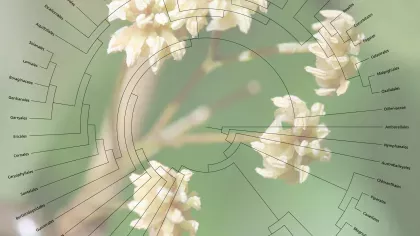Completing the Plant Tree of Life
Discovering and disseminating the evolutionary history of all plant genera.

The tree of life is fundamental knowledge for the biological sciences.
Like an evolutionary roadmap, it is essential for the exploration, prediction and exploitation of the properties of life on Earth.
From the identification of species new to science to the discovery of novel biomolecules or crops, the potential of the tree of life is immense but is yet to be fully harnessed because many of the tree’s branches remain unknown.
Since 2015, Kew has been working to complete the flowering plant tree of life by gathering genomic data for at least one species of every known genus.
We have now generated genomic data for ca. 60% of all flowering plant genera.
Achievements to date include:
- A comprehensive flowering plant tree of life for nearly 8,000 of the 13,600 genera published in the journal Nature. Based on the Angiosperms353 nuclear gene set, it reveals how flowering plants evolved across geological time.
- An open data portal, the Kew Tree of Life Explorer, launched in February 2021, through which our tree of life and all underpinning data are made publicly available in regular releases. The latest update (Release 3.0) went live in April 2023.
- The development of Angiosperms353, an innovative, open access, genomic toolkit for tree of life research on any flowering plant.
- Numerous scientific publications, including special issues of American Journal of Botany and Applications in Plant Sciences.
- Open access data production and analysis protocols.
- Establishment of a network of >300 collaborating scientists worldwide, driving numerous subprojects under the PAFTOL umbrella.
- Numerous public engagement activities at Kew and online.
Completing the plant tree of life
We are currently working to complete the global evolutionary backbone for plants at the genus level by sequencing the remaining ca. 5,600 genera of flowering plants by 2025, building on our collaborative network to achieve this. We expect to publish significant scientific results on the evolution and classification of flowering plants.
Dynamically disseminating the flowering plant tree of life online
Kew Tree of Life Explorer through regular data releases and new developments to enhance its functionality.
- A complete tree of life for all 13,600 genera of flowering plants
- New genomic data for 5,600 genera of flowering plants that have not yet been analysed, made rapidly and openly accessible to all
- A redeveloped version of the Kew Tree of Life Explorer with novel functionality that responds to user requirements and increases reach
- Regular public data releases via the Kew Tree of Life Explorer, comprising the latest new data and updated version of the plant tree of life
- Scientific publications reporting novel evolutionary and taxonomic research based on our data
- Opportunities for training the next generation of plant biologists via internships and MSc/PhDs
- New public engagement opportunities in the setting of the Agius Evolution Garden
PRINCIPAL INVESTIGATORS
Prof William Baker
Dr Félix Forest
Dr Ilia Leitch
Dr Paul Kersey
PROJECT STAFF
Data production team
Dr Olivier Maurin
Catherine McGinnie
Katherin Restrepo-Sulez
Raquel Negrao
Dr Alexandre Zuntini
Robyn Cowan
Data analysis team
Dr Paul Bailey
Dr Berta Gallego
Kew Tree of Life Explorer team
Emile Loveday
Jeffrey Cook
Honorary Research Associate
Dr Wolf Eiserhardt
Project alumni
Vanessa Barber
Dr Abigail Barker
Dr Sidonie Bellot
Dr Laura Botigue
Grace Brewer
Dr Tom Carruthers
Dr Jim Clarkson
Dr Steven Dodsworth
Niroshini Epitawalage
Dr Elaine Francoso
Dr Jan Kim
Dr Kevin Leempoel
Dr Jode Morena-Villena
Dr Lisa Pokorny
Dr Shyamali Roy
Malcolm Stone
Dr Eduardo Toledo
- The Calleva Foundation
Data are available and publicly accessible via the Kew Tree of Life Explorer and our secure FTP.
All data generated by the Tree of Life initiative are publicly released under a Creative Commons Attribution 4.0 International (CC BY 4.0) license and the Toronto guidelines on pre-publication data sharing (Toronto International Data Release Workshop Authors 2009).
Raw sequence reads are deposited in the European Nucleotide Archive under umbrella project PRJEB35285.
Scripts and other files relating to our phylogenomic pipeline are available at our GitHub.
Full details of the methods workflow for plants can be found in Baker et al. 2022.
A summary of our methods can be found on the Tree of Life Explorer.
We collaborate with over 300 individuals in 117 institutions and 21 countries. If you are interested in collaborating with us, please get in touch.
Partner initiatives
Genomics for Australian Plants (Bioplatforms Australia, enabled by NCRIS)
Collaborative projects
Projects on the following plant families are currently underway. If you would like to find out more about our progress, or how to contribute, please email the associated contact:
Acanthaceae, Achariaceae, Aizoaceae, Anacardiaceae, Amaryllidaceae, Apiales, Aquifoliales, Araceae, Arecaceae, Asphodelaceae, Asteraceae, Caryophyllales, Celastrales, Chrysobalanaceae, Connaraceae, Cunoniaceae, Cyperaceae, Dioscoreales, Orchidaceae, Ericales, Euphorbiaceae, Fabaceae, Gentianales, Lamiales, Laurales (Monimiaceae), Linderniaceae, Magnoliales, Malpighiales, Malvales, Moraceae, Myristicaceae, Myrtales, Ochnaceae, Oxalidales, Poaceae, Podostemaceae, Portulacineae, Primulaceae, Sapindaceae, Sapindales, Solanaceae, Thymelaeaceae & Urticaceae.
All Plant Tree of Life publications are listed in our Research Repository.


